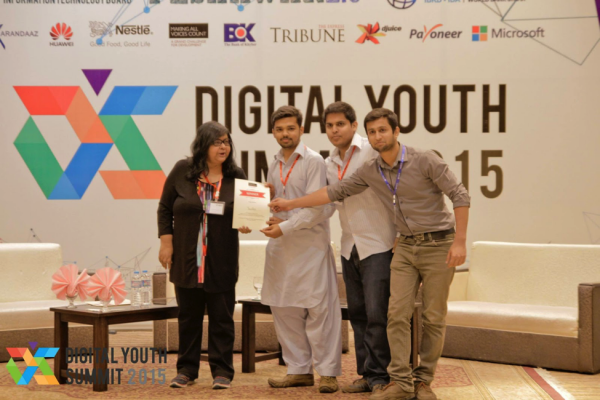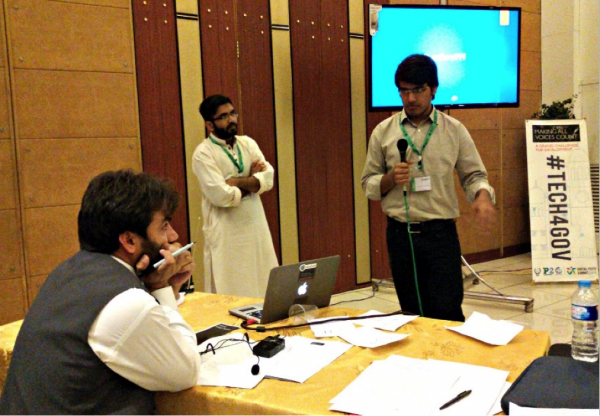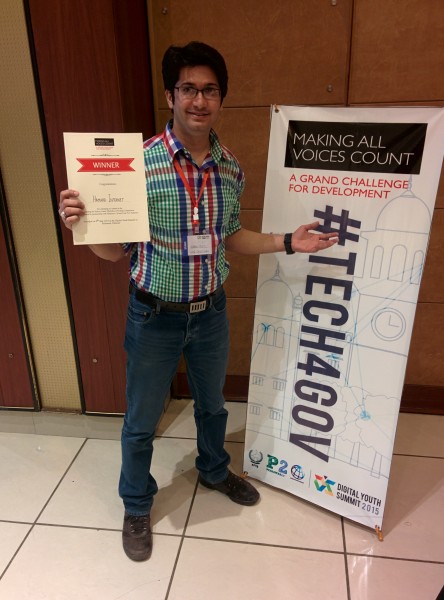Ten years ago, if you wanted to secure funding for an international development project, you’d write a project proposal, put together a log-frame and send it to a donor.
Today, both donors and people they are funding are exploring new ways to inspire, improve and showcase their ideas for new projects – and are increasingly using commercial, competitive approaches to do so.
Earlier this month, Making All Voices Count ran a quick-fire, competitive pitching session at the Digital Youth Summit in Peshawar, where two great ideas emerged as winners.
- Digital Rights Foundation’s Hamara Internet, which works to support digital security for women in Pakistan
- TrackReps, a mobile and web-based platform for citizens to track progress and performance of elected representatives, a first of its kind in Pakistan
Where our pitching sessions are unusual is that they don’t just offer funding, but the winners secure three months of mentoring to develop their projects and prepare them for a grant of up to £40,000.
Development practices from the commercial world
In a pitching session, finalists have only a few minutes to present their ideas to a panel of experts, who decide which ideas have the potential to move forward.
Pitching sessions themselves are a competition, but they’re also a conversation between the finalists and actors from the government, technology, private and public sectors, who offer feedback, and work with teams to develop and improve their ideas.
For this session, we partnered with Peshawar 2.0 and Code for Pakistan, bringing finalists chosen from a Pakistan-wide call for applications to pitch at the annual Digital Youth Summit, where more than 3500 entrepreneurs, government and international agencies, students and start-ups gather to discuss tech and tech4gov initiatives in Pakistan.
By bringing finalists to the Digital Youth Summit, we wanted to support the winning teams not only to compete for funding, but also to connect with new opportunities and networks to help improve their ideas – including the pitching session jury, which included Jehan Ara, founder of Nest I/O and P@sha, and Faisal Chohan, Senior Ted Fellow and founder of BrightSpyre and Coglient Solutions.
Takeaways
What’s clear from the pitching sessions we’ve held so far in Pakistan, Kenya, Ghana and the Philippines is that they’re a good way for us to reach and attract people from the tech and innovation space – people who have creative and practical ideas for addressing governance challenges, but who may not engage in typical grant-making processes.
Pitching is not a replacement for traditional approaches to sourcing development proposals, but it is an effective addition to the growing number of ways in which programmes like Making All Voices Count can reach out and find new ideas that would not come through ‘usual’ channels. As Ehtisham Siddiqui from TrackReps reflects:
Such pitching competitions are seldom held in Pakistan where many people have ideas, but not the platforms to express themselves. Also, it’s an amazing opportunity to not only share your idea, but in return get support in the form of mentoring and/or funding.
As the opportunities in tech and innovation continue to grow, so must we.


